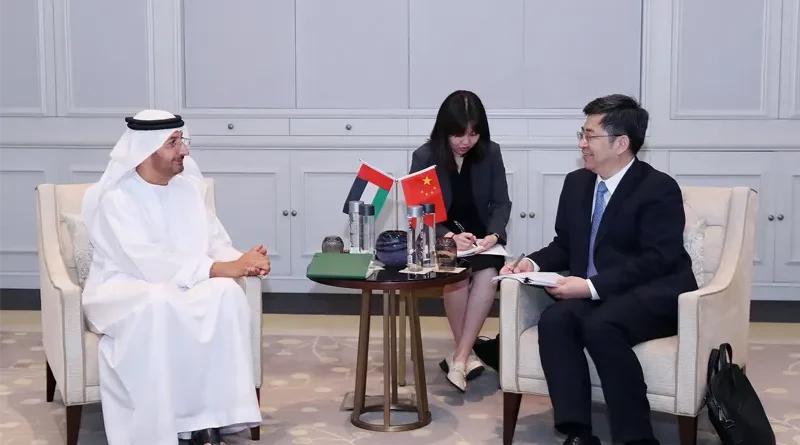UAE, China review enhancing joint investment opportunities in new economic sectors
DUBAI: Abdullah Ahmad Al Saleh, Under-Secretary of the Ministry of Economy, held a bilateral meeting with Zhang Xiangchen, Deputy International Trade Representative for the People’s Republic of China, on the sidelines of the recently held UAE-China Economic Forum in Dubai.
During their meeting, the two sides discussed enhancing joint investment opportunities in new economic sectors, trade, logistical transportation, real estate, financial services, technology and insurance activities.
Al Saleh stressed that the UAE-China historical ties are based on strategic partnership and cooperation, and have witnessed great development over the past four decades in all fields, especially economic and trade, which serves the two countries’ development direction and supports the growth and sustainability of their economies.
“The UAE is China’s first Arab and Gulf trade partner during 2021. China is also the UAE’s first trade partner, as the value of non-oil intra-trade between the two countries amounted to more than AED 264.2 billion (US$72 billion) in 2022, achieving a growth of 18 percent compared to AED 223.8 billion (US$ 61 billion) in 2021,” he said.
Al Saleh continued, “The mutual investments between the two countries are witnessing continuous growth in various economic and commercial sectors, most notably real estate, logistical transportation, storage, financial services, insurance activities, manufacturing and information technology. Bilateral investments between the UAE and China reached nearly AED 44 billion (US$12 billion) until early In 2021. China is also the third-largest foreign investor in the UAE at the global level, with a balance of foreign direct investments that amounted to US$9.3 billion until the beginning of 2021, and achieved a growth of 514.5 percent compared to the beginning of 2013.”
The Under-Secretary of the Ministry of Economy briefed the Chinese side on the economic policies adopted by the UAE to enable and enhance the competitiveness of the investment environment and its growth, including providing incentives and supportive enablers to encourage the private sector to invest and expand in the country’s markets, amending the Commercial Companies Law, which allowed 100 percent foreign ownership, and supporting the increase of labour mobility and modernising residency systems in the country.

